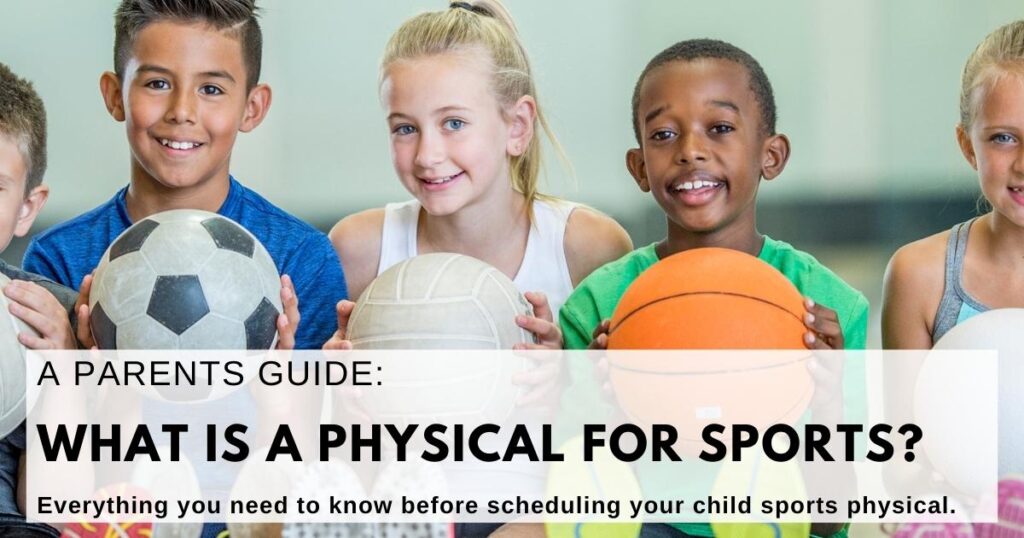Is your child a sports enthusiast and planning to join school sports this coming season? Sports participation is great until you find out your child is at increased risk of getting hurt.
Before gearing up for the athletics season, schedule a sport physical to ensure the health and well-being of your child.
Don’t know what a sports physical will entail? In this guide, we will discuss everything you must know to get the sports physical for your kid conveniently.
What is a Sports physical?
A sports physical, also called a pre-participation physical evaluation (PPE), assesses whether an individual is safe to participate in a particular sport. It focuses on maintaining an athlete’s physical health while minimizing the chance of injury. Student-athletes should go through sports physicals periodically for preventive care.
In PPE, the health care provider determines your child’s health and fitness levels through medical and physical exams.
Most schools and organizations require a pre-participation physical exam before allowing your child to participate in school sports.
What is Included in a Sports Physical?
The sports physical focuses on reviewing the athlete’s health history and physical exam to ensure they are healthy enough to play a part in a sport.
Medical History
In this examination portion, your doctor will ask questions about the child’s personal and family medical history. A medical professional will ask questions directly or ask you to fill out a form. The purpose of taking a medical history is to address any issues or detect any underlying condition in your child. The following questions are most likely to be asked:
- Family medical history
- Current medical illnesses such as diabetes, asthma, COVID-19, etc.
- Allergies
- Current fitness level
- Mental health or mood disorders
- Previous hospitalizations or surgeries
- History of passing out, chest pain, or trouble breathing during physical activity
- Past injuries such as broken bones, sprains, or fractures
- Current medications you are taking, i.e., OTC medication, prescription drugs, dietary supplements, or herbal remedies
- Smoking, vaping, and use of alcohol or drugs
- Girls will be asked about their menstruation cycle, and boys about testicle pain.
Physical exam
Physical examination is the second portion of sports physical, which includes:
- Measure weight and height
- Check vitals, such as blood pressure and heart rate
- Vision and hearing test
- Heart and lung sounds
- Examine bones, joints, child’s posture, strength, flexibility, and balance
- Test your child’s reflexes
- Monitor abdomen, nose, and throat
Why Are Sports Physicals Important?
Sports physical is crucial as it identifies and addresses any underlying health problem that would otherwise prevent your child from participating in sports. This comprehensive evaluation of physical health tells how your child’s body will respond to a new sport or physical activity. It also pinpoints issues that could arise while playing a specific sport in the long term.
Apart from declaring them fit for a particular sport. School sports physicals allow doctors to counsel your child on good lifestyle choices and exercise tips to help them stay healthy.
Why Does Your Child Need a Physical For Sports?
Pre-participation physical examination raises awareness of health issues and reduces injuries because of physical activity. It is vital that your child clear school PPE to ensure that he/she is fit enough to compete. It is also a great way to discuss treatment plans to optimize your child’s performance.
How Often Does My Child Need a Sports Physical?
Getting your child’s sports physical annually (once a year) is enough to monitor their health and prevent them from sports injuries. However, if your child has a sports injury, such as a bone fracture or a broken ankle, they should get a physical before practicing again.
Another recommendation is getting PPE at least six weeks prior to the school sports season. This helps determine if your kid is fit to participate.
Does a Parent Have to be Present For a Sports Physical?
Yes, parents/guardians must be present at sports physicals with kids under 18. The parents should carefully fill out the forms regarding family and child medical history.
What if Your Child Does Not Pass a Sports Physical?
If they deem your child unfit to participate in school sports because of any medical condition, the doctor will recommend a follow-up exam, medical tests, or refer your child to a specialist. The specialists will carefully monitor your child’s health and provide the proper care so they can energetically participate in school sports programs.
Where Should You Go For a Sports Physical?
It is better to visit your regular pediatrician for sports physicals, as they are already familiar with your child’s health and family history. They can also make referrals in case of severe health conditions.
Some teens also prefer getting their sports physical at school. In school physical exams, the kids will have to go to a “station” set up in the gym where they have sports physical specialists to conduct the physicals.
What Should My Child Bring For a Sports Physical?
To make your sports physical a smooth process, bring along:
- Proper identification and sports physical form (if necessary)
- Complete medical transcript
- Updated vaccination records
- A list of current conditions and medications (if any)
- Medical clearance letters
- List of allergies, prior bone, and joint injuries
- Past hospitalization or surgery
- History of weight gain or loss
- Corrective use of glasses or lenses
What Should You Expect During a Sports Physical?
We divide the sports physical exam into 2 parts: medical history and physical exam.
During the medical history, the doctor will take a medical history of your child either directly or may ask them to fill out a health history form. A physical exam then followed it, in which the doctor will monitor the child’s vitals, measure height and weight, check reflexes, vision, etc.
Can Chiropractors Give Sports Physicals in California?
Yes, chiropractors can give sports physicals to athletes just like any other medical practitioner.
How Can Chiropractors Help Athletes?
A licensed chiropractor boosts athletic performance and improves range of motion by restoring the general health of your body. They use special techniques to reduce pain and muscle stiffness and recover quickly. It also eliminates the need to take unnecessary medications.
Chiropractors provide student-athletes strength, speed, and flexibility to help them compete.
Ventura Country Chiropractic Care
Whether your child has dreams of becoming a pro athlete or just beginning, seek chiropractic care to boost their performance and prevent injuries.
Looking for a qualified chiropractor in Ventura or Oxnard areas? You are in the right place. Your child can stay on top of their game with our chiropractic wellness care.
Book your appointment with one of our friendly staff today.


